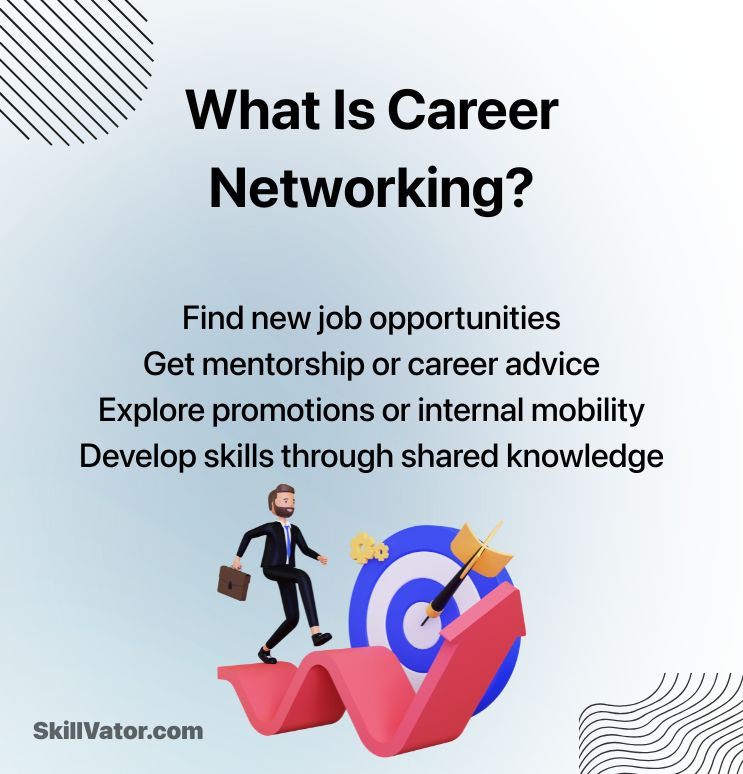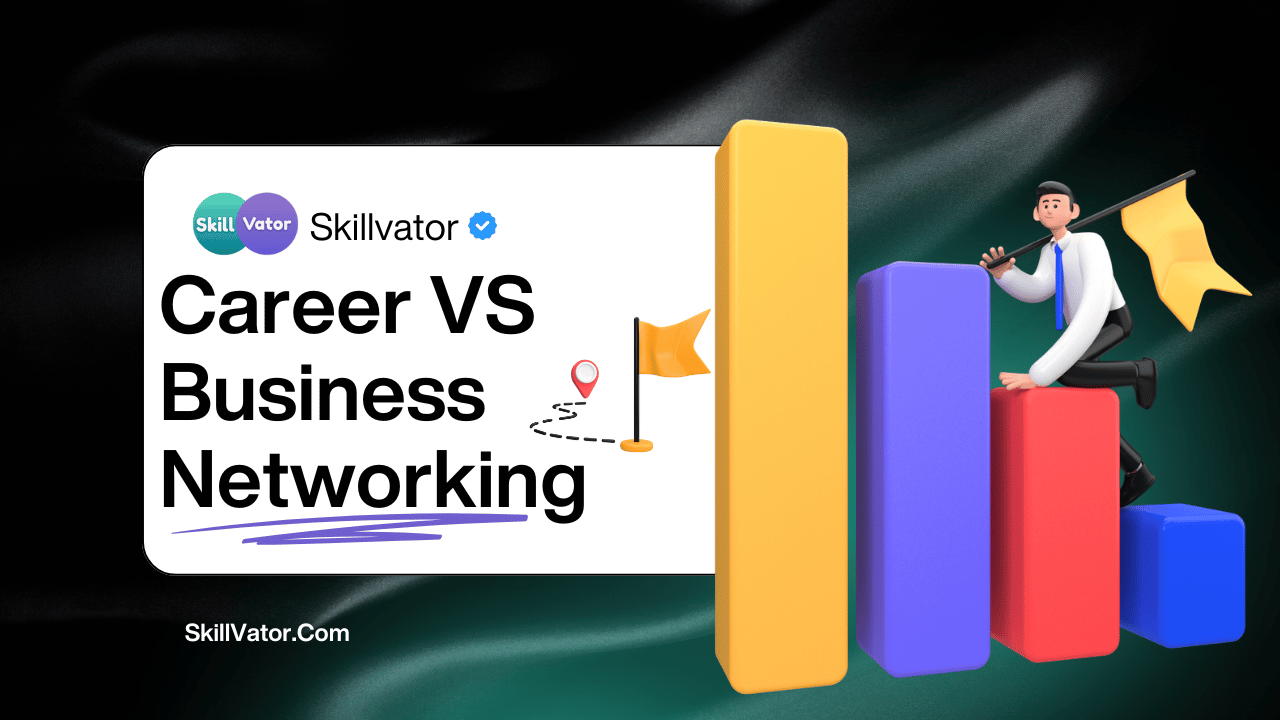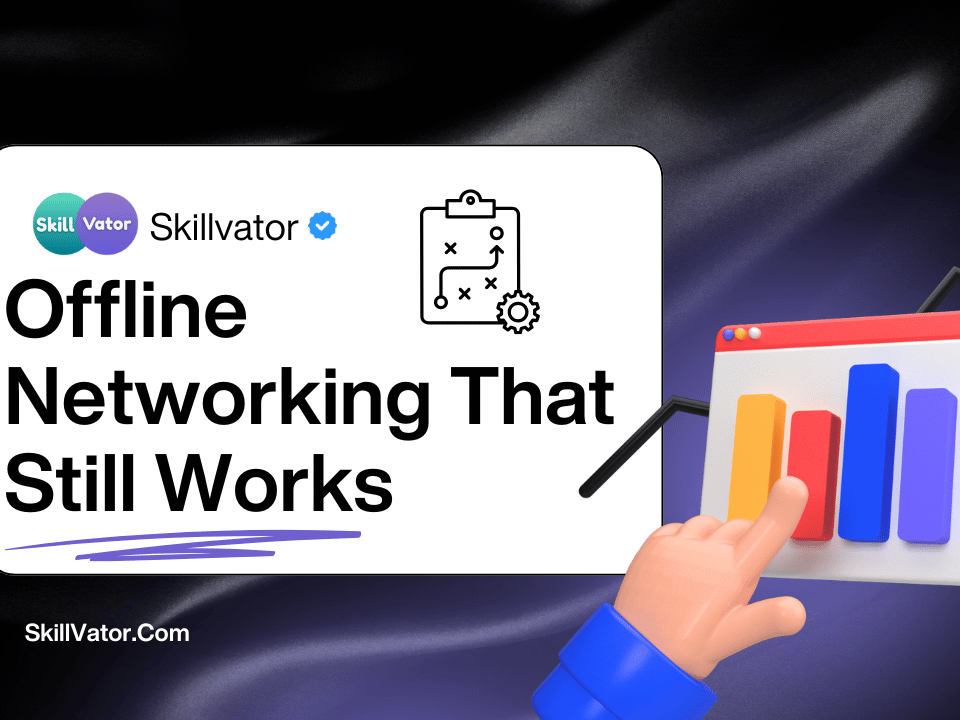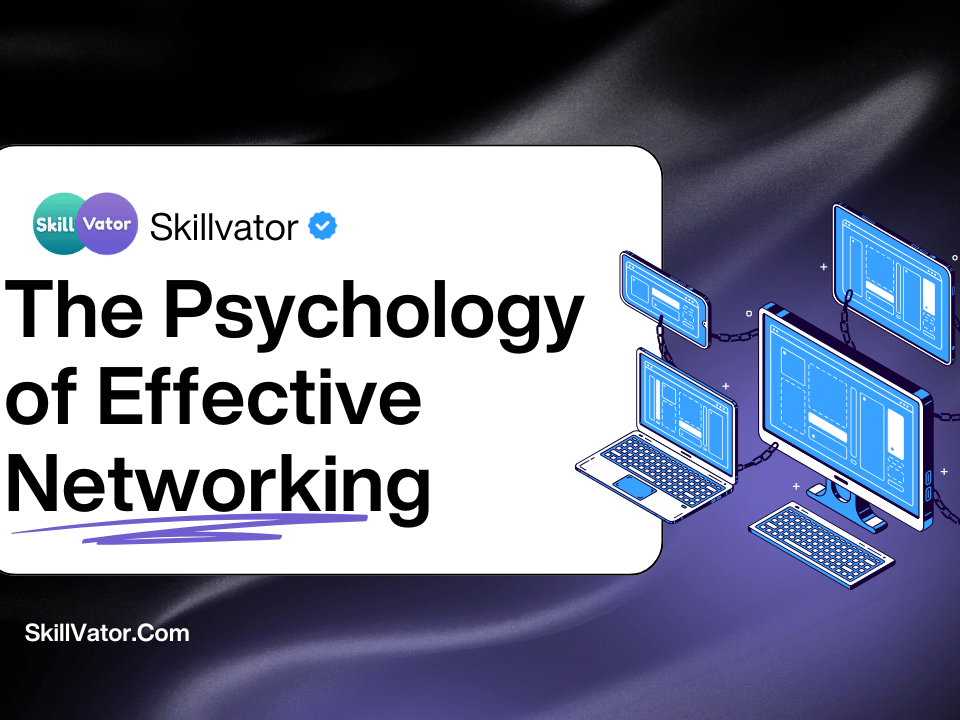When we think of “networking,” most of us imagine handing out business cards at an event or connecting with strangers on LinkedIn. But here’s the thing: not all networking is the same.
In fact, there are two main types of networking that professionals often confuse — career networking vs business networking. While both involve building relationships, they serve different purposes, require different strategies, and deliver different outcomes.
If you want to grow your career in 2025 and beyond, understanding these key differences can help you focus your energy in the right direction. stay with Skillvator and ME : Raha Heydari
What Is Career Networking?
Career networking is all about building connections to grow your professional journey. Think of it as a support system that helps you:
-
Find new job opportunities
-
Get mentorship or career advice
-
Explore promotions or internal mobility
-
Develop skills through shared knowledge
Examples of career networking include:
-
Attending an industry conference to meet recruiters
-
Asking a colleague for mentorship
-
Joining professional LinkedIn groups
-
Reaching out to alumni networks for guidance
👉 In short, career networking is personal. It’s about investing in relationships that directly impact your career development.

What Is Business Networking?
On the other hand, business networking focuses less on individual growth and more on organizational or entrepreneurial goals.
Business networking helps you:
-
Generate leads and sales opportunities
-
Build strategic partnerships
-
Increase brand visibility
-
Exchange services or resources
Examples of business networking include:
-
Attending trade shows to meet potential clients
-
Joining a local Chamber of Commerce
-
Hosting a B2B webinar to attract partners
-
Collaborating with other businesses for joint ventures
👉 In short, business networking is transactional. It’s about building mutually beneficial relationships that help a company grow.
Career Networking vs Business Networking : Key Differences
Let’s break down the main differences in a simple table so you can quickly see how they compare:
| Aspect | Career Networking | Business Networking |
|---|---|---|
| Goal | Advance personal career | Grow business or brand |
| Focus | Mentorship, jobs, skills | Clients, sales, partnerships |
| Approach | Relationship-driven | Opportunity-driven |
| Key Players | Recruiters, mentors, peers | Entrepreneurs, executives, decision-makers |
| Value Exchange | Knowledge, advice, introductions | Products, services, contracts |
| Best Platforms | LinkedIn, alumni groups, professional forums | Trade shows, business clubs, B2B events |
In today’s fast-paced professional landscape, success isn’t just about what you know—it’s about who you know and how you connect. This post explores the critical roles of networking and relationship building in shaping career trajectories in 2025. You’ll learn how to build authentic connections, leverage networks for opportunities, and cultivate long-term professional relationships that propel you forward. Whether you’re just starting or aiming for the next level, these insights will help unlock new doors in your career.
Networking and Relationship Building: Keys to Unlocking Career Success in 2025
Why Resume Strategy Matters for Networking
Here’s where many professionals miss a crucial point: your resume isn’t just for applying to jobs.
-
In career networking, your resume helps mentors, recruiters, or HR understand your skills, potential, and career path.
-
In business networking, it’s not your resume but your business profile, pitch deck, or company portfolio that does the talking.
👉 Raha Heydari says: “Think of your resume as your career passport and your business pitch as your corporate passport. Both open doors, but to very different destinations.”
Common Mistakes to Avoid in Career Networking vs Business Networking
Here are the pitfalls that can limit your success:
In Career Networking
-
Only reaching out when you need a job
-
Failing to nurture long-term relationships
-
Treating networking as “transactional” instead of relational
-
Not updating your LinkedIn or resume before connecting
In Business Networking
-
Focusing only on selling, not relationship-building
-
Ignoring follow-ups after meeting potential partners
-
Attending events without a clear value proposition
-
Forgetting that trust comes before transactions
👉 The bottom line: whether career or business, networking is about value exchange, not just self-interest.
How to Excel at Career Networking
If you’re looking to boost your career networking in 2025, here are some practical steps:
-
Leverage LinkedIn wisely
-
Post insights, not just job updates
-
Engage with industry conversations
-
Connect with alumni and former colleagues
-
-
Find mentors and sponsors
-
Mentors give advice
-
Sponsors actively advocate for you
-
-
Be proactive but authentic
-
Don’t just send generic “Hi, can we connect?” messages
-
Offer value, share resources, ask smart questions
-
-
Use informational interviews
-
Reach out to professionals to learn about roles, not to ask for jobs directly
-
How to Excel at Business Networking
For entrepreneurs and professionals building a brand, business networking requires a slightly different approach:
-
Have a clear elevator pitch
-
Define who you are, what you do, and who you serve — in 30 seconds.
-
-
Offer solutions, not services
-
Position yourself around solving a problem, not just “selling a product.”
-
-
Join the right communities
-
Industry associations, masterminds, Chamber of Commerce, B2B platforms
-
-
Be consistent with follow-ups
-
Send thank-you notes, set up meetings, nurture the relationship beyond the first event.
-

Where Career and Business Networking Overlap
Although they are different, career and business networking do overlap in some ways:
-
Both rely heavily on trust and credibility
-
Both require you to give before you ask
-
Both thrive on authentic connections rather than shallow exchanges
-
Both benefit from strong communication and soft skills
👉 This overlap is where soft skills like empathy, active listening, and adaptability become your competitive edge.
People Also Ask – FAQs
1. What is the main difference between career networking and business networking?
Career networking focuses on personal career growth (mentorship, jobs, promotions), while business networking focuses on organizational growth (clients, sales, partnerships).
2. Can career networking turn into business networking?
Yes! A mentor from your career network could later become a client or collaborator in your business. Relationships often evolve over time.
3. Is LinkedIn better for career networking or business networking?
Both — LinkedIn is versatile. For career networking, focus on personal branding and connections with recruiters. For business networking, build authority with content and connect with decision-makers.
4. Do introverts struggle more with networking?
Not necessarily. Introverts often excel because they listen deeply and build quality over quantity relationships. Networking is about authentic connections, not just being extroverted.
Conclusion
At the end of the day, career networking vs business networking isn’t about choosing one over the other — it’s about knowing which to focus on depending on your goals.
-
If you’re advancing your career path, career networking is your key.
-
If you’re growing your business or brand, business networking will be your engine.
Both require authenticity, strategy, and consistency. And as I often remind Skillvator readers:
“Networking is not about collecting contacts; it’s about building meaningful relationships that open doors to opportunities.” – Raha Heydari, Founder of Skillvator
📚 Useful Articles & Papers
-
“Effects of Networking on Career Success: A Longitudinal Study” (Wolff & Moser) — focuses on how building, maintaining, and using networks relates to career outcomes like salary and satisfaction over time. homepages.se.edu
-
“Top 12 benefits of networking: Why networking is important” (Michael Page) — good for pulling out what people gain from networking (both career/business). Michael Page
-
“Why Networking Is Still Important And How To Use It …” (Forbes) — advice and insights on using networking proactively, particularly for career growth. Forbes
-
“Relationship Building vs. Networking: What’s the Difference?” (Breakcold) — helpful for clarifying what may distinguish deeper, ongoing relationships from more transactional networking. breakcold.com
-
“Why You Need to Expand Your Professional Network” (Voices at Berkeley) — covers reasons and motivations for growing one’s network, relevant for both career & business perspectives. UC Berkeley Extension | Voices
-
“The Importance of Professional Networking: A Pathway to Career Success” (Faizan, SSBRJ) — academic discussion on networking’s significance in professional/career settings. ssbrc.com





